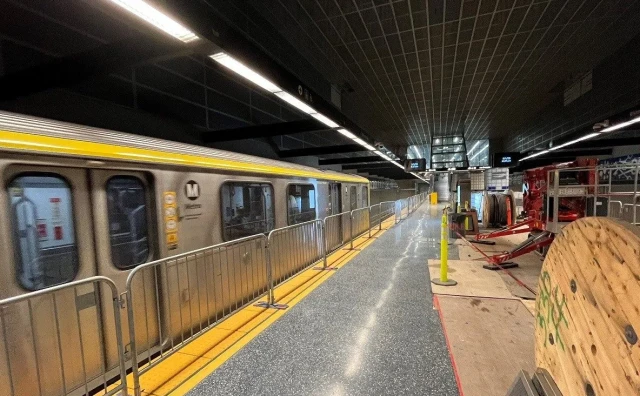With our free press under threat and federal funding for public media gone, your support matters more than ever. Help keep the LAist newsroom strong, become a monthly member or increase your support today during our fall member drive.
This archival content was written, edited, and published prior to LAist's acquisition by its current owner, Southern California Public Radio ("SCPR"). Content, such as language choice and subject matter, in archival articles therefore may not align with SCPR's current editorial standards. To learn more about those standards and why we make this distinction, please click here.
A Gold Mining Company Wants To Shrink A National Monument In The Mojave

Newcastle Gold Ltd., a Canadian gold mining firm that operates a mine in the Mojave desert, has allegedly shifted its position on the creation of the Castle Mountains National Monument; while the firm once publicly supported the designation of the monument, new reports suggest the company is seeking to have the borders of Castle Mountains shrunk. Gerald Panneton, chief executive of Newcastle, has stated that the national monument's current borders were marked without proper consultation with the company, and that it may hinder their ability "to explore and grow,” according to the Los Angeles Times.
In February 2016, then-President Barack Obama used the Antiquities Act to formally designate a roughly 21,000-acre site of California's Mojave desert as the Castle Mountains National Monument. The borders of the monument surround, but do not include, an 8,300-acre parcel gold mine owned by Newcastle. The gold mine was shuttered over a decade ago due to low gold prices, reports The Desert Sun, but now Newcastle is looking to reopen it. According to the Times, President Obama's designation of the Castle Mountains monument allowed Newcastle to continue with its plans to extract 10 million tons of ore from the site through 2025.
“The company appreciates that it has been consulted throughout this process,” Newcastle said in 2016 of the new monuments borders, notes the Times. “The new land designation reflects a compromise position that meets our needs as well as respecting the interests of other stakeholders in the area.”
In April 2017, President Donald Trump signed an executive order calling on the Interior Department to review the designation of 27 national monuments under the Antiquities Act—including Castle Mountains.
“To ask for Castle Mountains to be put under review is really surprising because an agreement was hammered out,” David Lamfrom, a director with the National Parks Conservation Association, said, notes the Desert Sun. “The public has weighed in and said they want these places to be protected.”
According to the Times, both Newcastle and Rep. Paul Cook (who represents the Congressional district encompassing Castle Mountains), have called for a reduction to the borders of the national monument.
In an op-ed published in the Desert Dispatch, Rep. Cook accuses President Obama of creating Castle Mountains National Monument "out of thin air," and by using an "abusive process" to do so that did not solicit the input of stakeholders or the public.
"My position on Castle Mountains has never changed: no monument should be created without public input," Cook continues.
According to the Times, Panneton, who joined the firm following Castle Mountains' designation, confirmed that the mining company met with Secretary of the Interior Ryan Zinke in June about reducing Castle Mountains National Monument by some 50%. Panneton said the company's previous statement was “words used to calm investors.”
“There were never adequate consultations with us,” Panneton continued.
The Trump administration is still reviewing the designation of Castle Mountains. Rep. Cook has suggested that the land should return to the Bureau of Land Management, but that any protective designation should incorporate public input.
As Cook told the Desert Sun, the "...discussion must be facilitated through legislation and public outreach, not behind closed doors, such as it did during the Obama administration.”
At LAist, we believe in journalism without censorship and the right of a free press to speak truth to those in power. Our hard-hitting watchdog reporting on local government, climate, and the ongoing housing and homelessness crisis is trustworthy, independent and freely accessible to everyone thanks to the support of readers like you.
But the game has changed: Congress voted to eliminate funding for public media across the country. Here at LAist that means a loss of $1.7 million in our budget every year. We want to assure you that despite growing threats to free press and free speech, LAist will remain a voice you know and trust. Speaking frankly, the amount of reader support we receive will help determine how strong of a newsroom we are going forward to cover the important news in our community.
We’re asking you to stand up for independent reporting that will not be silenced. With more individuals like you supporting this public service, we can continue to provide essential coverage for Southern Californians that you can’t find anywhere else. Become a monthly member today to help sustain this mission.
Thank you for your generous support and belief in the value of independent news.

-
Metro officials said it will be able to announce an opening date “soon.”
-
While working for the county, the DA’s office alleges that 13 employees fraudulently filed for unemployment, claiming to earn less than $600 a week.
-
The L.A. County Board of Supervisors on Tuesday voted to declare immigration enforcement actions a local emergency.
-
Tens of thousands of workers across Southern California walk out over pay and staffing issues.
-
People in and around recent burn scars should be alert to the risk of debris flows. Typical October weather will be back later this week.
-
Jet Propulsion Laboratory leadership says the cuts amount to 11% of the workforce.







